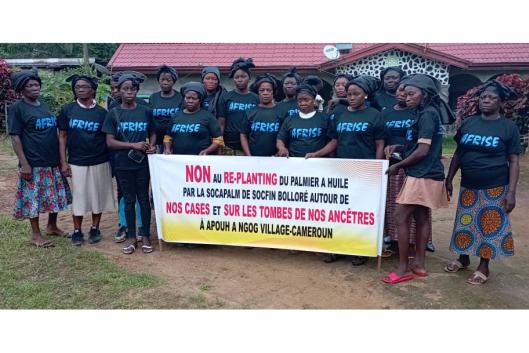A group of women are determined to stop the replanting of oil palm in the village of Apouh en Ngog, in the district of Edéa 1 (department of Sanaga-Maritime, Littoral region) in Cameroon. They are denouncing that the company, Socapalm, continues to set up monoculture plantations around the homes and ancestral graves of their community—which is causing severe impacts on their lives.
“If they do not stop these operations, the women who live close to Socapalm in Edéa will have to endure another 50 years of suffering, abuse, rape, theft, hunger, frustration and violation of our rights, our privacy and our dignity. This would corner our whole community into living in a fundamentally painful, unjust, miserable and unbearable way,” they denounced in an international petition launched on November 25th, the International Day for the Elimination of Violence Against Women.
In the petition, the women—organized in the Association of (Women) Neighbors of Socapalm in Edéa (Afrise, by its French acronym)—remarked: “The history of abuses committed by companies in the oil palm sector is not new in Cameroon, nor is it new in the region”. Here you can listen to the testimony (in French) of Ms. Ngon Bissou Félicite Hortenseof, president of Afrise.
Socapalm is a subsidiary of Socfin, a Luxembourg-based agribusiness group that operates oil palm and rubber tree plantations. Socfin, whose majority shareholders are French billionaire Vincent Bolloré and the Belgian Fabri family, operates in eight countries in Central and West Africa. Its beginnings in the region date back to colonial times, when, in collusion with the World Bank, it managed to appropriate thousands of hectares of land. (1)
Today, Socfin controls approximately 58,000 hectares in Cameroon that were granted to it in concession. (2) It is currently in the process of renewing its plantations, replacing the oldest and least productive palm trees with new ones in order to increase its profits—which in 2021 surpassed 80 million euros. (3)
In a show of contempt towards the communities that have been fighting to reclaim their lands for years, the company is planting trees mere meters away from people's homes, and even on the graves of their loved ones. (4) The communities have been trying to stop this barbarity. However, Socapalm has suspended dialogue with them and is moving forward with replanting. Women from the community have written a letter to the president of Cameroon asking him to act. But there has been no response.
Additionally, in a classic tactic used by companies to silence those who oppose their activities, the traditional community leader was imprisoned — a fact that the women also denounce in their petition.
Industrial oil palm plantations are synonymous with land-grabbing, territorial destruction, slavery, multiple forms of violence against communities, sexual violations, economic fraud, and many other things. (5) Socfin is no exception; on the contrary, it is a clear example of all of the above. (6) Violence is intrinsic to the large-scale plantation model, which must homogenize the territory, destroy the collective, and destroy the diverse and rich forms of production and reproduction.
Oil palm companies also need to dismantle the resistance and, above all, the struggle of women to recover their lands and the collective control of their territories and lives. Therefore, physical and sexual violence is used as a daily corporate tactic to control, intimidate and silence women. Sexual abuse is commonplace for women and girls who have to walk through shadowy plantations every day to fetch water, or to go to school, their farms, or markets where they can sell their products — since their villages have become completely surrounded by monoculture plantations.
Fed up with this situation, the women of Afrise launched a petition demanding that the company and the president of Cameroon listen to them. In it, they describe a situation that urgently needs to end: “90% of us have given our bodies to the guards in order to access the plantation. Our children are not employed by the company and they end up taking drugs, engaging in illegal activities, or taking the illegal immigration route only to die at sea. We are left to our own devices in a system that is not immune to corruption.”
And they manifest: “We will not accept spending the next 50 years in this misery. We are determined to fight to free our lands and obtain living spaces for our children, who are the current and future generations.”
We express our total solidarity with these women, who—despite the suffering—are resisting, organizing and fighting to regain their dignity!
We invite you to read the complete petition here, and to share it as widely as possible.
(1) WRM Bulletin 252, The Enduring Legacy of a Little-Known World Bank Project to Secure African Plantations for European Billionaires, November 2020
(2) CorpWatch, Palm Oil Giant SOCAPALM to Return Sacred Land Back to Mbonjo Villagers in Cameroon, mayo 2023.
(3) Watch Africa, Socfin exploitation of rubber & palm oil linked to deforestation & human rights abuses in Ghana & Nigeria, October 2023.
(4) Rights of women living near agroindustries, ACCESS to land against famine. Video in French.
(5) Mongabay, Plantation giant Socfin accused of dodging taxes in Africa, October 2021.
(6) WRM Bulletin 233, SOCFIN's Plantations in Africa: Many Places of Violence and Destruction, September 2017.
